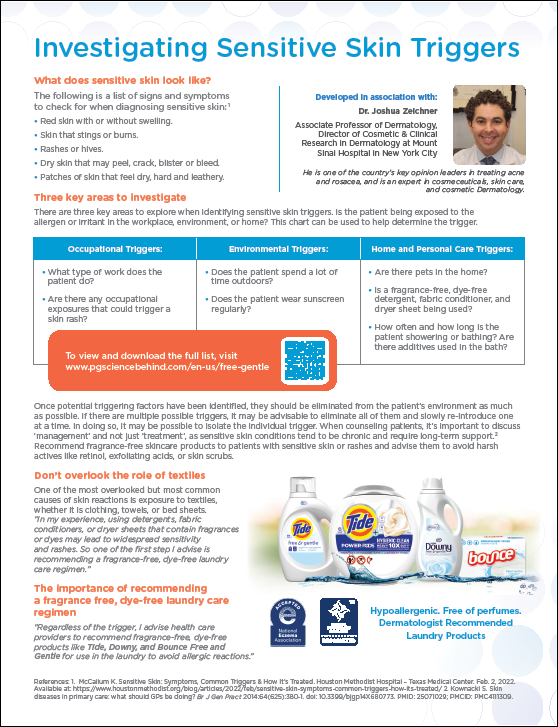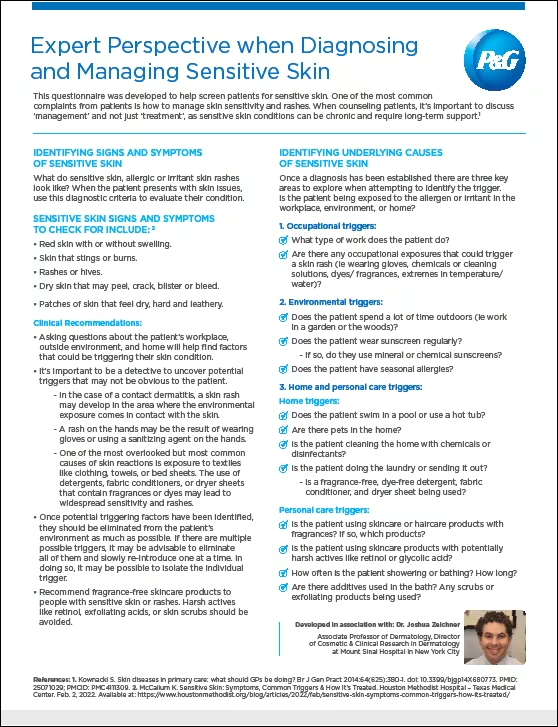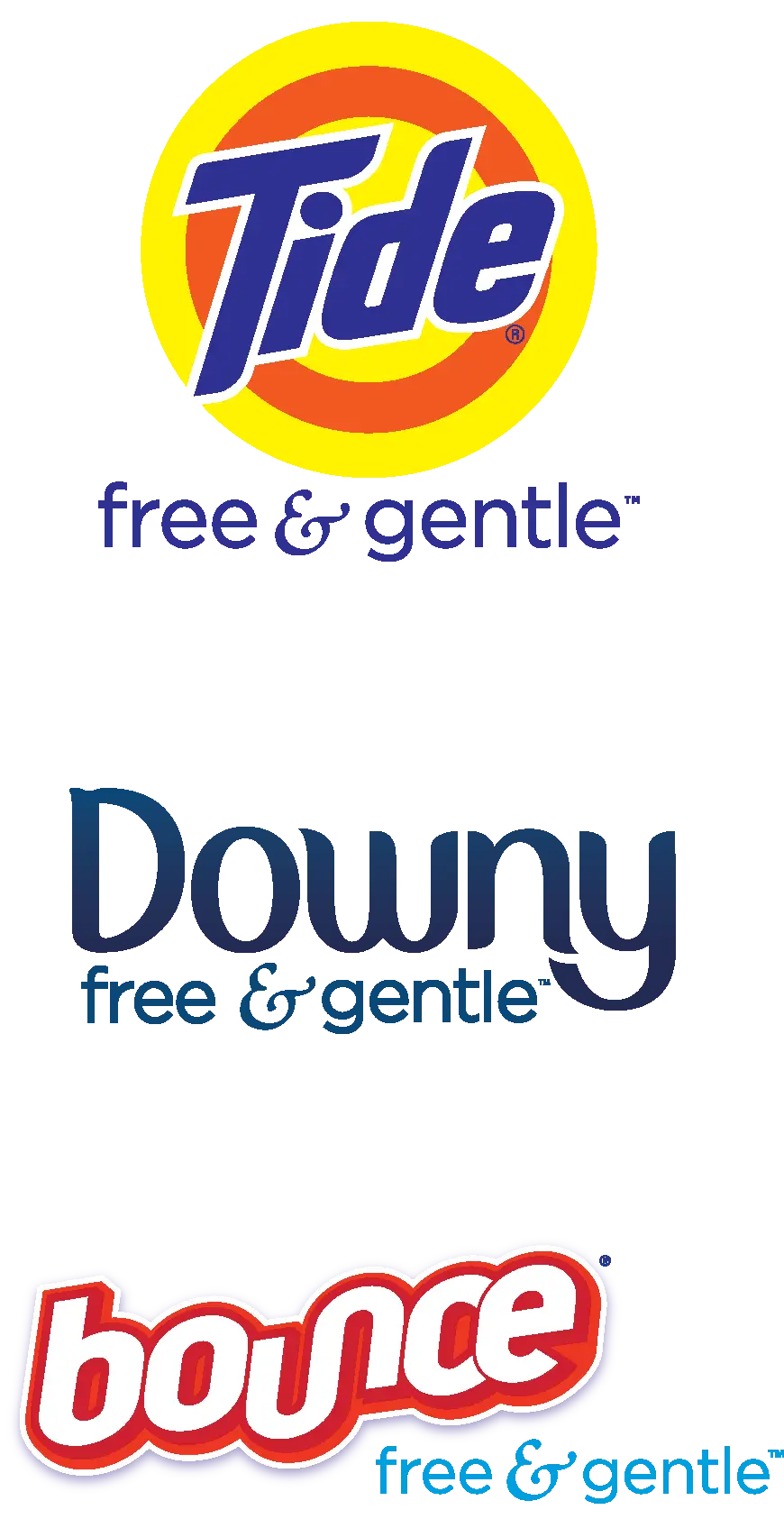BETTER TOGE+HER
The clinical data behind the Dermatologist recommended laundry products.
UNDERSTANDING SENSITIVE SKIN
Sensitive skin is a common problem, but it’s not a medical diagnosis. In technical terms it means that sensitive skin is more susceptible to inflammation or reacting to irritants.1 When a patient has sensitive skin, they can react strongly to the chemicals, dyes, and fragrances in products that come in contact with their skin. They might also get rashes or irritation from their clothing or friction. If your patient is reacting to fragrances, rough clothing or contact friction from fabric, this may be a signal that it’s time to change to a “free” laundry regimen.1
45%
of adults report having sensitive skin.180%
of dermatologists recommend the use of laundry detergents that are free of dyes and perfumes for patients with sensitive skin.260%
of patients are not satisfied with their “free” detergent and switch to a non-free detergent3†86%
would be willing to pay more for a detergent if it cleaned better3
- Of patients who use both a free detergent and fabric softener/ dryer sheets, 87% use scented fabric softeners/dryer sheets.‡
Tide, Downy and Bounce Free & Gentle have been
extensively researched and consistently shown to be mild on skin
while still delivering better cleaning* and outstanding conditioning.
Click here to review the Overview.
*vs. the leading free detergent
†When people switch from the leading “free” laundry detergent.
‡P&G data on file

IDENTIFYING SIGNS
& SYMPTOMS
OF SENSITIVE
SKIN

INVESTIGATING
SENSITIVE SKIN TRIGGERS – WHAT TO LOOK FOR
References:
1. Sensitive Skin. Home remedies and prevention. Medical New Today. Available at: https://www.medicalnewstoday.com/articles/sensitive-skin
2. Misery, L., Sibaud, V., Merial-Kieny, C., & Taieb, C. Sensitive skin in the American population: Prevalence, clinical data, and role of the dermatologist. Int J Dermatol. 2011;50:961-967.
3. P&G data on file. Canadian data is based on an Internet survey of 150 dermatologists licensed to practice in Canada conducted in January 2018.
CLINICAL STUDIES:
TIDE FREE & GENTLE
Tide Free & Gentle’s Lift and Block Technology cleans down to the fiber level and prevents soils from redepositing, demonstrating superior cleaning ability.*
- • Enzymes break up hard-to-remove stains and surfactants lift out stains, dirt and odor particles down to the fiber level.
- • Concentrated polymers sweep in to trap the dirt in the wash water, to prevent it from reattaching to the fabric.
Tide Free & Gentle is recognized by the National Psoriasis Foundation§ and the National Eczema Association‡.
TIDE FREE & GENTLE IS MADE FOR SENSITIVE SKIN
Created with over a decade of research and 88 clinical studies, Tide Free & Gentle is made for patients with sensitive skin.
In multiple repeat-insult patch tests performed by dermatologist-supervised studies, Tide Free & Gentle is continually shown to be mild to sensitive skin. Fabrics washed in Tide Free & Gentle or distilled water are not significantly different with respect to levels of irritation.
*vs. the leading free detergent. Original image in B&W. Soil has been colorized to show contrast. P&G data on file.
§ Based on exclusive partnership with NPF. For more information about
the National Psoriasis Foundation Recognized seal, please go to
www.psoriasis.org/seal.
‡ National Eczema Association Seal of Acceptance™ has been granted to
Tide Free & Gentle, Tide PODS Free & Gentle, Downy Liquid Free & Gentle,
Tide Free & Gentle Hygienic Clean Heavy Duty, Tide PODS Free & Gentle
Hygienic Clean Heavy Duty, and Tide Ultra Oxi Free PODS.
DOWNY FREE & GENTLE
Downy Free and Gentle can provide sensitive skin benefits, by reducing friction between clothes and skin2 Conditioned fabrics are shown to be more gentle on skin.
Made without perfumes and dyes, Downy Free & Gentle deposits a layer of softening molecules on clothing fibers to reduce fabric friction. For patients with sensitive skin, this can help to reduce irriation and sensitivity.
References:
1. Clinical research, forearm wet & dry towel test, Piérard GE et al, University of Liège, Belgium.
2. Hermannsa J et al.. Beneficial Effects of Softened Fabrics on Atopic Skin. Dermatology 2001;202:167–170..
BOUNCE FREE & GENTLE
Patients with sensitive skin concerns should be encouraged to complete their “free” laundry regimen with Bounce Free & Gentle. According to The American Academy of Dermatology, scented dryer sheets may contribute to irritation1.
• Helps provide relief for patients who
are sensitive to rough clothing.
• Further enhances the fabric care
process with an anti-static treatment to repel animal hair from clothes.*
*P&G data on file
Reference :1. American Academy of Dermatology. Eczema tips to help children feel better. Available at: https://www.aad.org/media/media-news-releases.
*Tide Free & Gentle liquid detergent, Tide PODS Free & Gentle detergent, Downy Free & Gentle liquid fabric conditioner, Tide Hygienic Clean Heavy Duty 10x Free Liquid Laundry Detergent, Tide Hygienic Clean Heavy Duty 10x Free Power PODS Laundry Detergent, and Tide PODS Ultra Oxi Free Laundry Detergent have all earned the National Eczema Association Seal of Acceptance.
®Registered Trademark of National Eczema Association, used under license.
†Earned National Psoriasis Foundation Seal of Recognition, excluding Bounce Free & Gentle dryer sheets.


